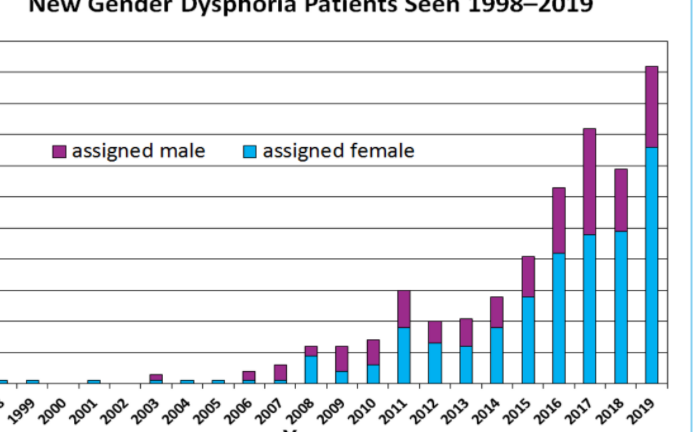Specialized Trans-Clinic Referrals Rising
"[The percentage of trans and nonbinary children undergoing surgery dropped in 2022 as hospitals in Canada were forced to deal with the catch-up of pandemic-driven surgical backlogs]. But the private clinics just kept churning them through.""The fact that you can't get the numbers [of trans-surgeries] from private clinics ... it's very cloak-and-dagger. They're still billing OHIP [Ontario Health Insurance Plan]. That's tax dollars. That should be publicly accessible information. We need to see these numbers and ask questions.""If this was just about the schools, and just about kids being allowed to wear what they want and say what they want and be called whatever name they want and it stopped there, who would care? But medicine got involved."Medical practitioner familiar with trans medicine, requesting anonymity to avoid professional repercussions"[Trans teens are known to be at higher risk of harassment and cyberbullying. Early access to surgery may reduce the bullying, or help facilitate] age-appropriate romantic and sexual development in adolescents who may otherwise be prevented from engaging in these activities due to gender dysphoria."Authors of a recent review on surgical and ethical concerns of gender affirming surgery in teens

A new analysis on medical care of trans children indicates that hundreds of adolescents in Canada have undergone "top surgery"; double mastectomies for female-to-male makeovers in the past five years. In 2018-19 there were 536 hospitalizations and day surgery visits for bilateral mastectomies for gender reassignment surgery. By 2022-23, that number had risen sharply to 985, reflecting data compiled by the Canadian Institute for Health Information.
Youth 18 and under saw 602 cases of a total of 4,071 visits involving gender-affirming mastectomies or breast reductions since 2018. Of the 602 involved, 303 reflected teens of age 17 and younger, with the youngest being 14 years of age. The data do not include hospitals in Quebec, along with surgeries performed in private clinics. One such private clinic in Mississauga, Ontario, the McLean Clinic, describes its surgeons as "industry pioneers" in top surgery.
Top surgery includes mastectomies and breast reductions in people recognized at birth as female, and the reverse -- breast augmentation for those born male who are transitioning to female. According to one specialist in transgender health issues, "50 to 70 percent will go to McLean" when applying for OHIP coverage for those looking for taxpayer-funded top surgery.
 |
Removing breasts to achieve a flatter, masculinized torso characterizes female-to-male chest surgery, to align the person's physical presence with their gender identity to reduce gender dysphoria, defined as persistent distress accompanying the mismatch between the identifying gender and birth gender. Uncertainties exist relating to the long-term health effects, the potential for regret and whether trans identity will be lasting.
Society in general is polarized about the complex issues involved -- from health professionals, human rights groups and school boards approving the new open gender theology and the increasingly commonplace issues around transitioning, inclusive of gender-blocking drugs administered to children at and pre-puberty and surgical procedures that are life-changing and enduring being undertaken with little research being done respecting the possibility of future harm.
Above all, parents are confused and upset about the new role assigned them by many school boards and hospitals as non-involved bystanders in their children's futures. Where instructions go out to teachers and to health staff to pay attention solely to the claims of a child and to studiously avoid involving parents in requests to change pronouns, names and recognition of an alter-gender choice; honouring and respecting a child's choice, negating the parental role in guidance and nurturing their child.
 | |
| New rules will help 8-yr-old Warner down the road. CTV News |
The first country to authorize legal gender transitions in 1972, Sweden last year began limiting mastectomies for teenage girls to research settings. "The uncertain state of knowledge calls for caution", warned the head of the country's National Board of Health and Welfare.
A dramatic shift in the sex ratio of children and teens referred to specialized gender identity clinics across the country, from predominantly young boys to children born female accounts for the rise in surgeries. It was found that 34 percent of those considered female at birth were referred for top surgery, according to a study involving 174 trans and nonbinary children and teens who were referred to ten gender identity clinics in Canada. At time of referral, most were 15 or 16 years of age.
Typically, for a double mastectomy, two incisions are made on the bottom border of the pectoral muscle or chest area. "The skin is then lifted to surgically remove the breast tissue underneath", according to the McLean Clinic's website. The nipples are removed, resized and repositioned by grafting "to suit the new masculine appearance of the chest".
Performed under general anesthetic, this is a day-surgery procedure taking approximately two hours to completion. Bruising, wound infections and scarring can result as complications. Nipple sensitivity is lost, along with the future capability of breastfeeding, should a pregnancy eventuate at some future date. The American Academy of Pediatrics is endorsed a gender-affirming approach to care promoting "optimal physical mental and social well-being". That major medical group suggests eligibility for gender-affirmative surgery in teens should be determined on a case-by-case basis.
Referrals growth to specialized clinics has been linked to greater awareness and social acceptance, allied with the teaching of gender identity in school settings, according to expert opinion. Why the phenomenon of gender dysphoria appears to be more common in girls is as yet unknown. "Decisions for care should be made by youth, their families and their health-care providers, who are best-positioned to support them", states the Toronto Sick Kids Hospital.

"What we do know is that regret does take place, and it does take place later on in life.""If we know that people can come to this realization that maybe this may have not been the best decision for them, if that takes place after five years or ten years, we don't have all the information to allow patients to make an informed decision.""[For such a permanent decision as the removal of healthy breasts], I'm always looking at the why, and because that hasn't been answered yet, that's what leads to my ambivalence.""What all this says to me is that we need to be much more thoughtful in our approach and in our assessments."Trans medicine specialist, speaking anonymously for fear of 'transphobic' labelling
Labels: Canada, Gender Dysphoria, Gender Transitions, Private Clinics, Trans Surgeries

0 Comments:
Post a Comment
<< Home